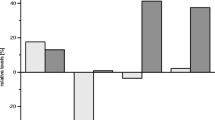Abstract
Heat-shock proteins (HSPs) are synthesized by animals and plants in response to various stressors. The level of the HSP60 stress protein was measured from the cell fraction of peripheral blood obtained from nestling house martins (Delichon urbica) to test whether ectoparasitism increased the concentration of stress protein. We assessed HSP from nestlings raised in nests previously treated with an insecticide or infested with 50 martin bugs (Oeciacus hirundinis). In addition, haematozoa infections were checked in blood smears. Nestlings from parasite-infested nests, or nestlings infected with trypanosomes, had increased levels of HSP in their blood cells. Nestling growth as determined from wing length was negatively related to HSP60 levels and within-brood variation in wing length increased with increasing levels of the stress protein independently of treatment and infection by trypanosomes. These results suggest HSPs may play a role in host-parasite interactions, and that they can be used reliably for measuring physiological responses to parasites.
Similar content being viewed by others
Author information
Authors and Affiliations
Additional information
Received: 4 February 1998 / Accepted: 4 May 1998
Rights and permissions
About this article
Cite this article
Merino, S., Martínez, J., Barbosa, A. et al. Increase in a heat-shock protein from blood cells in response of nestling house martins (Delichon urbica) to parasitism: an experimental approach. Oecologia 116, 343–347 (1998). https://doi.org/10.1007/s004420050596
Issue Date:
DOI: https://doi.org/10.1007/s004420050596




